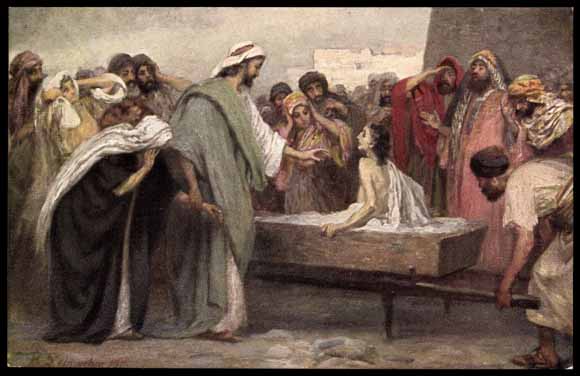
To listen to today’s reflection as a podcast, click here
Every day during this season of Lent we’re looking at the miracles of Jesus – his spectacular displays of supernatural power that are reported in the Gospels.
In his book Final Words, Adam Hamilton, senior pastor of the Church of the Resurrection in Kansas City, recalls a conversation that happened years ago at an elementary school in Manhattan, Kansas.
Roger, a fourth-grade teacher, had worked late one day. He stepped outside the school building well after the sun had set.
Glancing over at the playground, he noticed one of his students – a boy named Jonathan – swinging by himself in the darkness. Why, Roger asked, was he here by himself so late on a school night? Jonathan explained that his mother had left the family. His father worked all night and was seldom able to care for him.
That exchange set in motion a series of events that would transform the young boy’s life.
Within a year, Roger had facilitated Jonathan’s placement in a foster home. His father tried once more to provide for him. Jonathan moved back home, but things did not go well. That’s when his father approached Roger. Would this kind teacher be willing to open his home and his heart to Jonathan?
Hamilton writes, “Roger agreed and welcomed this child as if he were his own son.”
Jonathan blossomed under Roger’s mentoring and care. He excelled as a student and attended Kansas State University, traveled the country, then journeyed around the world. He fell in love with a beautiful young woman and married her. Together they served the poor in South Africa, then moved to Chicago, where he works with homeless inner-city boys.
Hamilton adds, “Jonathan and Roger’s story is particularly important to me, because the woman Jonathan married is my daughter.”
From the day Danielle had come into the world, he and his wife had been praying for the man she would one day marry. Who knew that that man’s life would ultimately be shaped by a schoolteacher who glanced over in the darkness at the school playground and felt a surge of compassion for an abandoned child?
Jesus was deeply moved to help children. In an era when little ones were largely ignored, and even the best rabbis assumed they counted for little in God’s eyes, Jesus noticed them.
The Gospels tell us that people brought babies to Jesus “to have him touch them” (Luke 18:15).
But the disciples were having none of it. They rebuked the parents for wasting Jesus’ time. Apparently they thought there ought to be a sign at the entrance to the kingdom of God: You must be this tall to participate in this adventure.
Jesus’ response is sharp-edged: “Don’t you dare prevent these little ones from coming to me, for God’s kingdom belongs to them!” There is apparently no minimum requirement of height, age, education, or experience to be assured of God’s attention.
And that includes miracles.
In fact, when we look at the spectrum of those who experience Jesus’ miraculous touch, he routinely reaches out to help the Least (lepers and paralytics, who were judged to be cursed by God); the Last (children who by virtue of their age have no voice in the life of Israel); and the Lost (demon-possessed individuals, and those who are literally dead).
Like Roger, who was drawn to intercede in Jonathan’s life, we see Jesus transform all the tomorrows of a family in the town of Nain. He interrupts a funeral procession and resurrects the young man in the casket, restoring him to his widowed mother (Luke 7:11-17). Jesus restores the demonized son of the distraught, doubting man in Mark 9:14-29. He heals the young girl of a Syrophonecian woman – a despised Gentile (Mark 7:24-29). And he brings back to life the 12-year-old daughter of Jairus, an endearing story we will visit tomorrow.
God’s heart brims with compassion for little ones.
But that’s not all. Jesus declares, “Unless you grownups become like little children, you yourselves will be on the outside looking in” (Luke 18:17).
What does it mean to become like little children? Author Gary Haugen points out that a child approaches virtually every situation with weakness, vulnerability, and neediness. Our problem is that we don’t particularly like to feel weak, vulnerable, and needy. We would much prefer to be in control.
When I was very young and my family was traveling by car, I was not in control. That was no doubt a very good thing.
My dad was usually behind the wheel. If it was nighttime, I would typically curl up in the backseat and fall asleep. My parents would ultimately carry me inside, and I would wake up in my own bed. It never occurred to me to worry whether my dad had had enough black coffee to drive safely through the night, or to remind him to be extra vigilant to watch for drunk drivers crossing the center line.
Children who are weak, vulnerable, needy, and trusting fall asleep in the backseat with the expectation that all shall be well.
Coming to Jesus like a child means that we refuse to be spiritual backseat drivers.
We don’t worry ourselves sick as to how God is managing the universe, or remind him that if he doesn’t answer our prayer requests exactly as we have framed them, our lives will surely go off the rails.
That’s because he is filled with compassion for the Least, the Last, and the Lost.
And that’s why we can fall asleep at night knowing that God is taking us to the place where we need to be – safely and on time.
